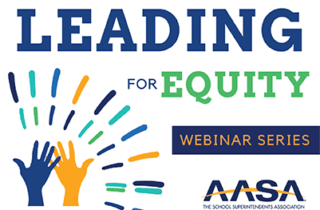Presented by Dr. Rick Miller; Dr. Sandy Husk; Dr. Karen Sullivan; and Dr. Kathleen Smith
Moderated by Dr. Jennifer Ferrari
While equity requires vision from its leaders, it also requires courage. During the edWebinar, “Leading for Equity: Courage to Lead with an Equity Agenda,” hosted by AASA, The Superintendents Association and AASA’s Leadership Network, Dr. Khalid Mumin, Superintendent of Reading School District (PA), and Marlon Styles, Superintendent of Middletown City Schools (OH), discussed the challenges they faced and the tough decisions they made to keep their equity agenda moving forward.
Equity is one of the most overused terms in education—not just because most can’t agree on a definition, but because the promise of equity is often not backed up by action. In the edWebinar, “Leading for Equity: Intentionality for Access and Opportunity,” hosted by AASA, The Superintendents Association and AASA’s Leadership Network, Dr. Gustavo Balderas, Superintendent of Edmonds School District (WA), and Dr. Heath Morrison, Superintendent of Montgomery Independent School District (TX), discussed how they’ve approached building equity throughout their careers and why acting upon an equity agenda is an urgent, right-now need.
As the COVID-19 crisis has forced schools to close their buildings and move online, inequities in access to technology, books, and even food have become more apparent. Still, there are ways educators can continue to support the learning needs of their full range of students and make the education they provide more equitable. During a recent edWebinar, Cornelius Minor, a Brooklyn-based educator and staff developer, and Dr. Jennifer Williams, a professor at St. Leo University’s College of Education, identified ways that teachers can increase their understanding of equity issues that may affect learning needs, in order to respond with effective solutions.
The goal of this edWebinar is to help educators start the work of equitable practices through more access, choice, and time—encouraging all students to be seen and heard while having multiple opportunities for biased free learning.
In this edWebinar three superintendents share how they are leading the complex issues involved in ensuring accessibility for all students.
In this report, SETDA builds upon the research and recommendations from prior publications with a focus on the role of state leadership in supporting districts and schools to increase high-speed connectivity and access for students and educators.






